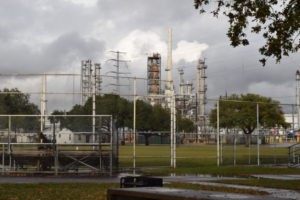In early December, our Director, Kathleen McTigue, and UUSC consultant, Syma Mirza met with four grassroots groups in Houston, Texas: the Fe y Justicia Worker Justice Center, the Texas Environmental Justice Advocacy Services (TEJAS), and the Living Hope Wheelchair Association, as well as the local Houston organizer for RAICES. Kathleen also met with members of four area UU congregations.
 Visiting Houston earlier this month was an eye-opening experience for me. Traveling with UUSC consultant Syma Mirza, I met some of the UUSC partner groups in Houston to learn about their post-Harvey work. One of them, the Texas Environmental Justice Advocacy Network (TEJAS), took us on their “toxic tour” so we could see for ourselves how vast and poisonous the industrial complexes on the Gulf really are. These immense industrial campuses that produce (and often release) toxic chemicals are located right next to homes, schools, and playgrounds. Even with the car windows rolled up, the air smells of chemicals. The populations closest to the toxins are, predictably, lower income and often communities of color, including those who are undocumented and live doubly in the shadows.
Visiting Houston earlier this month was an eye-opening experience for me. Traveling with UUSC consultant Syma Mirza, I met some of the UUSC partner groups in Houston to learn about their post-Harvey work. One of them, the Texas Environmental Justice Advocacy Network (TEJAS), took us on their “toxic tour” so we could see for ourselves how vast and poisonous the industrial complexes on the Gulf really are. These immense industrial campuses that produce (and often release) toxic chemicals are located right next to homes, schools, and playgrounds. Even with the car windows rolled up, the air smells of chemicals. The populations closest to the toxins are, predictably, lower income and often communities of color, including those who are undocumented and live doubly in the shadows.
We also gained insight into a particularly vicious dimension of intersectional oppression. As in so many other cities, Houston’s construction industry relies heavily on undocumented workers, especially in the more dangerous jobs. These workers are routinely subject to wage theft and workplace harassment, and post-Harvey are often sent into clean-up and demolition jobs without the proper protective equipment. When they become ill or are injured, they do not have recourse to the support and protections that most of us assume are available by law. And if they are disabled due to workplace injury, none of the standard support – from counseling to the proper kind of wheelchairs – are within their reach.
The Living Hope Wheelchair Association is a scrappy, grassroots organization working for the rights and dignity of people with spinal cord injuries, especially those who are undocumented.
Long before Harvey struck, Living Hope was providing life-saving services and equipment to its members, and building grassroots power to advocate for housing, employment, and transportation. But in the wake of Harvey’s destruction, and with their constituents profoundly vulnerable to the flood waters, the Association gained sudden new visibility.
We sat in their small office and listened to Board members tell their stories; all of them are living in wheelchairs, all are undocumented, and all devote countless volunteer hours to Living Hope. As I listened, one question kept arising for me: doesn’t their new visibility bring with it a new level of personal danger for these leaders, for arrest and deportation? One Board member responded, “Visibility brings more fear, but it won’t hold us back. To be honest, with Jeff Sessions as Attorney General we know they’ll come for whoever they want. We can’t control that, but we can control our commitment, our solidarity. That’s ours.”
We are proud to support the work of Living Hope through the UUSC disaster relief grants. As we enter the new year, UUCSJ will continue our conversations with these and other UUSC partners to discern when and how volunteers from outside the region might usefully support their work.
Sign up to join the volunteer list if you’re available to travel to Texas or Florida to support relief efforts and would like to hear more detailed information as it becomes available.

